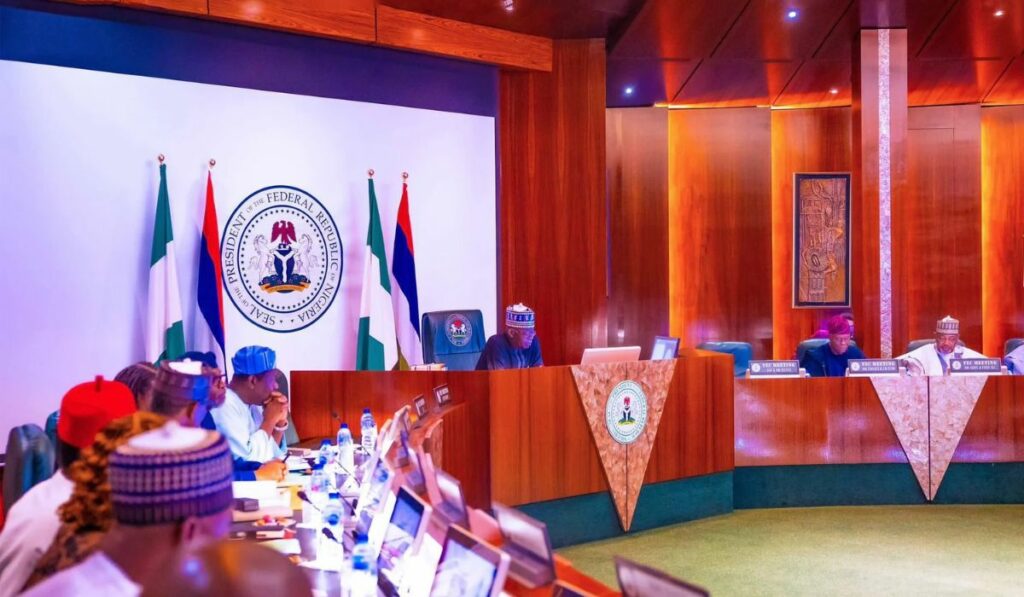Editorial
No To Increase In VAT
The Federal Government recently spoke
about a 100 percent rise in the Value-
Added Tax (VAT) in Nigeria, ostensibly to raise more money for the administration. But organised labour, civil society groups and indeed, the general public are wondering whether government considers the possible effect it would have on the nation’s already prostrate economy.
Coming at a time President Muhammadu Buhari was apologising to Nigerians over the hardship they were currently experiencing, the proposed increase may become the last straw that would break the resilience of many persons.
Even before the visit to Nigeria in January, by the Managing Director of the International Monetary Fund (IMF), Ms. Christine Lagarde, during which she urged the Federal Government to consider a gradual increase in VAT, there had been a few futile moves to raise the consumption tax. But it was Vice President Yemi Osinbajo’s speech at a recent forum in Lagos that gave the latest indication of government’s plan.
The VP had described the current five percent VAT rate in Nigeria as rather too low and hinted that the Buhari administration would increase the tax this year.
According to reports, VAT was introduced in Nigeria in September 1993 following the recommendation of a study group constituted two years earlier to review the country’s tax system. But its implementation did not commence until January 1994 after the promulgation of the VAT Decree No. 102 of 1993.
Going by this decree, VAT was to have an introductory rate of five percent which would last for two years before any consideration of an upward review both in its rate and coverage. But Nigerians have continued to resist attempts to double the five percent rate 22 years after VAT was introduced.
Analysts have also suggested that Nigeria has one of the lowest consumption tax rates in Africa. They particularly cited Ghana where the rate is 15 percent; Cameroun 19.25 percent; South Africa 14 percent; Zambia 17.5 percent. Kenya 14 percent; and Egypt which charges 25 percent on luxury goods.
Increasing the VAT rate and the items on which it applied may not be a bad idea, after all. In fact, if the VAT rate is doubled and its total accruals shared among the tiers of government, the projection is that it would serve to relieve many cash-strapped States and local governments. However, The Tide thinks that the plan is ill-timed and dismissive of the 300 percent hike in the price of fuel, 150 percent rise in price of bread and 300 percent increase in prices of sachet water and other household items.
It should worry the Federal Government that banks have become most economically enslaving in our time, especially, going by the kind of absurd service charges and VAT they exact from the customers; that electricity tariff has gone too high and inflation is heading toward the austerity level.
The people are groaning under a terribly deflated Naira, ridiculously low income regime and job losses. Indeed, the crime rate is at an all-time high.
While the government may be pointing to the law that makes for an upward review of VAT after two years, the same has not been considered for the National Minimum Wage, which raise has been long overdue too.
The Federal Government will need to drop the idea of a VAT increase now because its implementation will lead to the closure of businesses and more job losses and Nigeria will be the worse for it. Indeed, the people cannot help but resist the increase.
Much as government is right to raise taxes, the expectation of the people should also be considered. A situation where the average citizen provides water, electricity even security for himself, will make anyone ask what the taxes are used for.
Let the people be considered, especially the poor masses, whose income has continued to drop and prices of goods and services, up.
Editorial
That FEC’s Decision On Tertiary Institutions

Editorial
Addressing Unruly Behaviours At The Airports

It began as a seemingly minor in- flight disagreement. Comfort Emmason, a passenger on an Ibom Air flight from Uyo to Lagos, reportedly failed to switch off her mobile phone when instructed by the cabin crew. What should have been a routine enforcement of safety regulations spiralled into a physical confrontation, sparking a national debate on the limits of airline authority and the rights of passengers.
The Nigerian Bar Association (NBA) wasted no time in condemning the treatment meted out to Emmason. In a strongly worded statement, the body described the incident as “a flagrant violation of her fundamental human rights” and called for a thorough investigation into the conduct of the airline staff. The NBA stressed that while passengers must adhere to safety rules, such compliance should never be extracted through intimidation, violence, or humiliation.
Following the altercation, Emmason found herself arraigned before a Magistrate’s Court and remanded at Kirikiri Maximum Security Prison, a location more commonly associated with hardened criminals than with errant passengers. In a surprising turn of events, the Federal Government later dropped all charges against her, citing “overriding public interest” and concerns about due process.
Compounding her woes, Ibom Air initially imposed a lifetime ban preventing her from boarding its aircraft. That ban has now been lifted, following mounting public pressure and calls from rights groups for a more measured approach. The reversal has been welcomed by many as a step towards restoring fairness and proportionality in handling such disputes.
While her refusal to comply with crew instructions was undeniably inappropriate, questions linger about whether the punishment fit the offence. Was the swift escalation from verbal reminder to physical ejection a proportionate response, or an abuse of authority? The incident has reignited debate over how airlines balance safety enforcement with respect for passenger rights.
The Tide unequivocally condemns the brutal and degrading treatment the young Nigerian woman received from the airline’s staff. No regulation, however vital, justifies the use of physical force or the public shaming of a passenger. Such behaviour is antithetical to the principles of customer service, human dignity, and the rule of law.
Emmason’s own defiance warrants reproach. Cabin crew instructions, especially during boarding or take-off preparations, are not mere suggestions; they are safety mandates. Reports suggest she may have been unable to comply because of a malfunctioning power button on her device, but even so, she could have communicated this clearly to the crew. Rules exist to safeguard everyone on board, and passengers must treat them with due seriousness.
Nigerians, whether flying domestically or abroad, would do well to internalise the importance of orderliness in public spaces. Adherence to instructions, patience in queues, and courteous engagement with officials are hallmarks of civilised society. Disregard for these norms not only undermines safety but also projects a damaging image of the nation to the wider world.
The Emmason affair is not an isolated case. Former Edo State Governor and current Senator, Adams Oshiomhole, once found himself grounded after arriving late for an Air Peace flight. Witnesses alleged that he assaulted airline staff and ordered the closure of the terminal’s main entrance. This is hardly the conduct expected of a statesman.
More recently, a Nollywood-worthy episode unfolded at Abuja’s Nnamdi Azikiwe International Airport, involving Fuji icon “King”, Wasiu Ayinde Marshal, popularly known as KWAM1. In a viral video, he was seen exchanging heated words with officials after being prevented from boarding an aircraft.
Events took a dangerous turn when the aircraft, moving at near take-off speed, nearly clipped the 68-year-old musician’s head with its wing. Such an occurrence points to a serious breach of airport safety protocols, raising uncomfortable questions about operational discipline at Nigeria’s gateways.
According to accounts circulating online, Wasiu had attempted to board an aircraft while he was carrying an alcoholic drink and refused to relinquish it when challenged. His refusal led to de-boarding, after which the Aviation Minister, Festus Keyamo, imposed a six-month “no-fly” ban, citing “unacceptable” conduct.
It is deeply concerning that individuals of such prominence, including Emmason’s pilot adversary, whose careers have exposed them to some of the most disciplined aviation environments in the world, should exhibit conduct that diminishes the nation’s reputation. True leadership, whether in politics, culture, or professional life, calls for restraint and decorum, all the more when exercised under public scrutiny.
Most egregiously, in Emmason’s case, reports that she was forcibly stripped in public and filmed for online circulation are deeply disturbing. This was an act of humiliation and a gross invasion of privacy, violating her right to dignity and falling short of the standards expected in modern aviation. No person, regardless of the circumstances, should be subjected to such degrading treatment.
Ibom Air must ensure its staff are trained to treat passengers with proper decorum at all times. If Emmason had broken the law, security personnel could have been called in to handle the matter lawfully. Instead, her ordeal turned into a public spectacle. Those responsible for assaulting her should face prosecution, and the airline should be compelled to compensate her. Emmason, for her part, should pursue legal redress to reinforce the principle that justice and civility must prevail in Nigeria’s skies.
Editorial
Restoring PH’s Garden City Status

-
Business3 days ago
Bayelsa Recommits To Agro-Economy Diversification … As Delegation Rounds-Off Rwandan Tour
-
Business3 days ago
Shippers Council Seeks collaboration Against Stowaways
-
Politics3 days ago
Rivers APC Chairmanship Candidates Hail Tinubu, Yilwatda Over By-Election Victory
-
Politics3 days ago
PDP Drags Osun Federal Lawmakers To Court Over Defection To APC
-
Niger Delta3 days ago
Oborevwori Pledges Commitment To Renewable Energy Investments In Delta … As Delta Signs MoU With REA
-
Business3 days ago
FG Commits To Building Modern Maritime Sector
-

 News3 days ago
News3 days agoOver 1,500 RSU Students Apply For Education Loan
-
Politics3 days ago
Benue Assembly Resolution: Alia Suspends SUBEB Boss, Others

